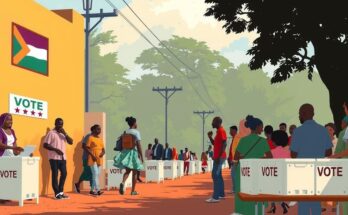During his visit to Latin America, U.S. Secretary of State Marco Rubio accused Cuba, Nicaragua, and Venezuela of causing a regional migration crisis. He labeled these regimes as “enemies of humanity” and highlighted the oppressive nature of their governance. Cuban President Miguel Diaz-Canel responded by blaming the U.S. embargo for the migration issues. Rubio’s tour also involved discussions with El Salvador’s President Nayib Bukele regarding the incarceration of U.S. convicts.
United States Secretary of State Marco Rubio has accused the authoritarian governments of Cuba, Nicaragua, and Venezuela of creating significant regional migration challenges. During his ongoing Latin America tour, Rubio labeled these governments as “enemies of humanity,” claiming their oppressive systems are integral to the migration crisis affecting the hemisphere. He made his comments while visiting Costa Rica, emphasizing that if these regimes did not exist, there would be no such crisis.
Focusing particularly on Nicaragua, Rubio expressed concerns about the recent constitutional amendment that has consolidated power within President Daniel Ortega’s administration. He described Nicaragua’s resulting governance as a familial dynasty that suppresses political opposition and punishes dissenters, leading many Nicaraguans to flee their homeland just as individuals are escaping from Cuba and Venezuela.
In response, Cuban President Miguel Diaz-Canel condemned Rubio’s statements, describing them as indicative of the “shamelessness” of US politicians. He attributed the migration crisis in Cuba to the more than six-decade-long U.S. trade embargo, asserting that tighter restrictions result in increased outflows of migrants.
Rubio’s visit continued as he proceeded to Guatemala following engagements in Panama and El Salvador. In a notable development, El Salvador’s President Nayib Bukele proposed the hosting of U.S. convicts in a mega-prison dedicated to gang members, which Rubio acknowledged appreciatively. Bukele also expressed willingness to accept deported gang members from various Latin American nations, including Venezuela.
The migration crisis in Latin America has been a significant issue, particularly in light of the authoritarian regimes in Cuba, Nicaragua, and Venezuela. These countries have faced criticism for their governance, which many argue leads to human rights abuses and political repression, prompting many citizens to flee. As the U.S. grapples with the resulting influx of migrants, high-level diplomatic discussions aim to address the root causes of this crisis. Rubio’s visit to the region underscores the U.S. government’s focus on migration policy and regional stability.
In summary, Marco Rubio’s strong denunciation of Cuba, Nicaragua, and Venezuela highlights the U.S. position on the linkage between authoritarian governance and migration crises. Both the U.S. and the affected Latin American countries continue to navigate the complex political and social dynamics resulting from these ongoing challenges. The discussions surrounding the migration crisis may influence future diplomatic and humanitarian efforts in the region.
Original Source: www.hindustantimes.com




